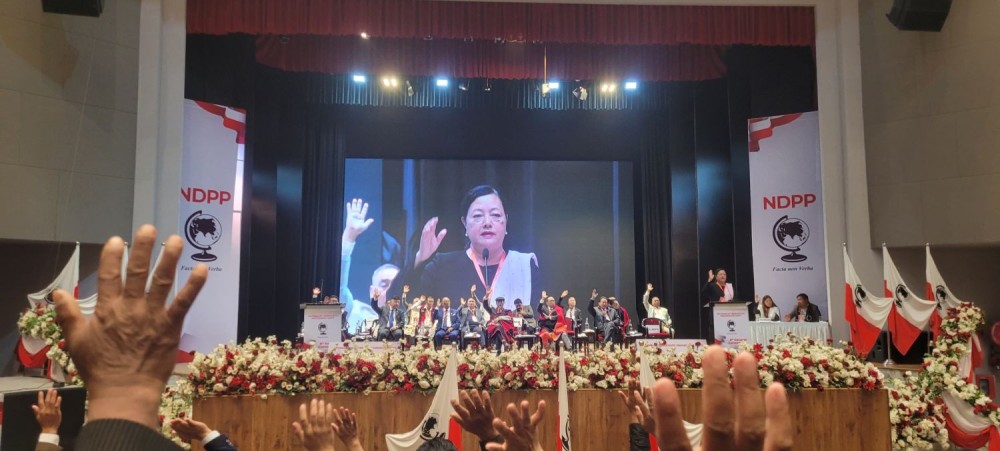NDPP leaders raise their hands in endorsement of the party resolution during the 5th NDPP General Convention in Kohima on February 27. (Morung Photo)

From Frontier Nagaland to the economy and more, NDPP adopts key resolutions
Our Correspondent
Kohima | February 27
The Nationalist Democratic Progressive Party (NDPP) adopted a series of resolutions at its 5th General Convention held in Kohima on February 27, reaffirming its commitment to the Indo-Naga political issue, economic growth, youth empowerment, governance, and the preservation of Naga culture and traditions. The resolution was put forward for adoption by Minister Salhoutuonuo Kruse, who is also convenor of resolution committee.
Naga talks and border fencing
The NDPP reiterated its commitment to the Indo-Naga political dialogue, stating that it remains the party’s top agenda. Expressing appreciation for the contributions of past and present Naga National Political Groups (NNPGs) and leaders, the party acknowledged their role in ensuring the recognition of the Naga people’s unique history and culture. It recalled the statement made by former Prime Minister Atal Bihari Vajpayee during his visit to Nagaland in 2003, which officially acknowledged the distinct identity of the Naga people.
Highlighting key milestones in the Naga political movement, the NDPP referenced the Bengal Eastern Frontier Regulation of 1873, the Representation to the Simon Commission in 1929, the Naga Plebiscite of 1951, the Framework Agreement of 2015, and the Agreed Position of 2017. The party reaffirmed its stance to "defend and protect the history and rights of the Naga people and to constantly make efforts to facilitate the realization of a lasting peace."
Calling for unity among all Naga political groups, the NDPP urged NNPGs to heed the aspirations of the people and work toward a negotiated settlement of the Indo-Naga issue. The party also appealed to the Government of India to expedite a final settlement that is “honourable, acceptable, and inclusive of all stakeholders.”
Addressing concerns over the Indo-Myanmar border, the NDPP strongly opposed the removal of the Free Movement Regime (FMR) and the construction of border fencing. "The removal of the FMR and the erection of border fences could adversely affect our State’s delicate situation and impede ongoing Indo-Naga political talks—potentially leading to civil unrest and deteriorating law and order," the resolution stated. The party called on the central government to halt these developments.
Economic growth
The NDPP affirmed its commitment to fostering economic growth and positioning Nagaland as a key player in India's "Act East Policy." The party envisioned the state becoming an economic hub and a gateway to ASEAN nations.
Commending the Nagaland government for its economic initiatives, the NDPP acknowledged programs such as the Chief Minister’s Micro Finance Initiative, the Chief Minister’s Universal Life Insurance Scheme, and the Disaster Risk Transfer Parametric Insurance Solution—the first of its kind in India. It urged the state government to continue supporting entrepreneurship, artificial intelligence, information technology, and sustainable agriculture to generate employment opportunities beyond the public sector.
The party also congratulated the government for successfully hosting the 25th edition of the Hornbill Festival, which it credited with propelling "Brand Nagaland" onto international platforms. The NDPP asserted that the growth of the tourism sector would "help reduce unemployment and directly benefit grassroots communities."
Additionally, the NDPP urged the Government of India to revoke the re-imposition of the Protected/Restricted Area Permit (PAP/RAP) regime, which it claimed hampers the growth of the tourism and industrial sectors. The party recorded its appreciation of Chief Minister Neiphiu Rio for raising this concern at the North-East Council meeting in January.
Boosting agri and youth development
Asserting that Nagaland has traditionally been an agrarian society, the NDPP called for a shift from subsistence farming to large-scale agricultural production using modern technology. It appealed to the government to facilitate policies that promote partnerships with experts and the adoption of blockchain technology, value addition, and organic farming strategies.
Regarding youth empowerment, the NDPP lauded the government’s policies on sports, start-ups, and entrepreneurship. It cited major events such as the Asia Music Summit, the South Asian Cross Country Championships, the North-East Olympics, and the Nagaland Super League as examples of initiatives that "promote employment generation and nurture young talent." The party also urged the government to continue supporting youth programs, including the Chief Minister’s Scholarship for Music and Arts, the Dr. T Ao State Sports Awards, and the Chief Minister’s Meritorious Students Scholarships.
The NDPP further called for the effective utilization of existing Special Purpose Vehicles (SPVs) in areas such as honey production, bamboo cultivation, and creative industries under the Task Force for Music & Arts (TAFMA) and the Investment & Development Authority of Nagaland (IDAN). The party stressed that these initiatives must provide young people with "ample opportunities to grow and benefit."
Transparency, governance
The NDPP reaffirmed its commitment to transparency, accountability, and good governance. It congratulated the government for creating six new districts—Noklak, Niuland, Chümoukedima, Tseminyu, Shamator, and Meluri—stating that the move "ensures that governance reaches the doorsteps of the people, opens new opportunities, and enables residents to be on par with the rest of the State."
The party also endorsed the demand of Eastern Nagaland’s people for the establishment of the Frontier Nagaland Territory, stating that it supports "their aspirations for development and all-around progress." It called for continued unity and brotherhood within the broader Naga community.






